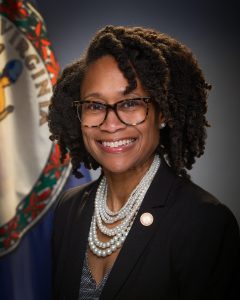 Dr. Vanessa Walker Harris is the Director of the Office of Family Health Services for the Virginia Department of Health (VDH). She is also the Chair of Richmond Memorial Health Foundation’s Board of Trustees and a former Virginia Secretary of Health and Human Resources.
Dr. Vanessa Walker Harris is the Director of the Office of Family Health Services for the Virginia Department of Health (VDH). She is also the Chair of Richmond Memorial Health Foundation’s Board of Trustees and a former Virginia Secretary of Health and Human Resources.
With such an impressive resume, we felt featuring Dr. Walker Harris in our “Voices from the Region” series would provide crucial insight into the current health and racial equity landscape.
When asked how she would define health and racial equity and what it looks like in practice, it’s no surprise that someone with the breadth and depth of Dr. Walker Harris’ expertise would have an immediate and impactful description.
“Health and racial equity is providing everyone a fair and just opportunity to achieve their health goals so that racism and other systemic problems are not barriers to their goals,” she said. “From my public health perspective, this looks like using data to drive action; it looks like identifying communities that may be vulnerable, then developing effective interventions across all levels of the social ecological model, from personal to community to policy.”
In her role within the Virginia Department of Health, Dr. Walker Harris similarly invoked the need for data as a way to accurately identify opportunities to both pursue and support health and racial equity efforts.
“When we’re taking a look at health outcomes and noticing there are differences between populations and then understanding why there are differences,” she said, “we must ask if these differences are caused by systems and structures. If so, then we must figure out interventions to mitigate those issues.”
But naming these systems and structures, she said, be they racism, patriarchy, or other oppressive systems, is only the first step. According to Dr. Walker Harris, we must also identify precisely how these systems are negatively impacting people’s opportunities, and then work collectively to dismantle them.
When asked what the most pressing challenge was to achieving health and racial equity in the Richmond Region, Dr. Walker Harris was quick to identify the most pressing issue.
“There are limited resources, and we have to target them to communities that have been made highly vulnerable,” she said. “Once we learn lessons from those projects, we can then identify opportunities to scale them to larger populations to see who else can benefit.”
Dr. Walker Harris also identified education as another challenge. She discussed the need to inform the wider community about the fact that there are systems and structures in place that impede the advancement of a multi-racial democracy where all communities have access to the support they need.
Looking at the bigger picture, Dr. Walker Harris views these challenges as part of a much bigger problem; one that she says needs to be solved before we can fully confront the lack of health and racial equity.
“We really need to shift the American philosophy of individualism and the related scarcity mindset to one of abundance; one of care for neighbors, community, family, and friends,” She said. “A mindset that shows a willingness to share resources. We need to radically reimagine our communities and support systems so that everyone can live in dignity and be able to fully actualize their gifts.”
Despite these enduring challenges, Dr. Walker Harris identified maternal health as a clear example of progress in Central Virginia. She mentioned that there is a broad acceptance of the systemic issues that drive inequities (especially for Black moms and native and indigenous moms), as well as a general interest to help address these inequities. She mentioned Virginia establishing Medicaid benefits for doulas, increasing access to state resources to become a certified doula, and the recent “Momnibus” legislative package supported by the General Assembly, which would provide additional funding to further improve maternal health outcomes.
At the culmination of our discussion, Dr. Walker-Harris closed with a community-wide call for courage, even amidst the fears of the current moment.
“There’s a lot of anxiety,” she said, “but there’s also an opportunity for bravery and for deepening our commitment to pushing toward a multi-racial democracy where we are intentional about the business of health and racial justice. The reality is that while there may be benefits to some, these oppressive systems are ultimately harming everyone. And when we finally realize that ‘our freedoms are bound up in each other,’ we can more effectively do the hard work required for all of us to be free.”